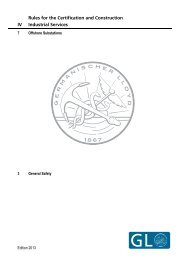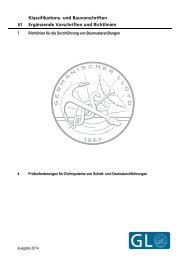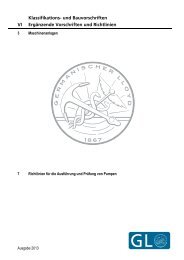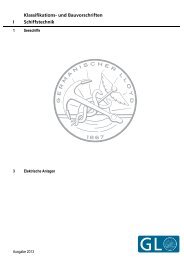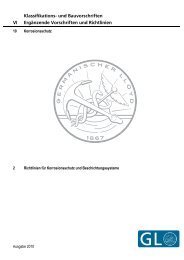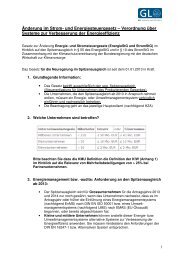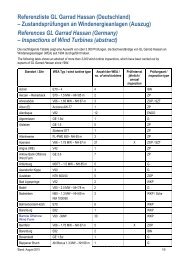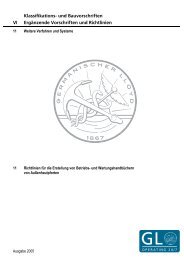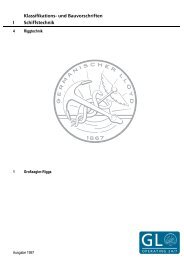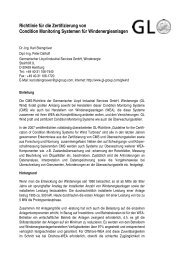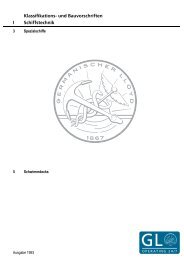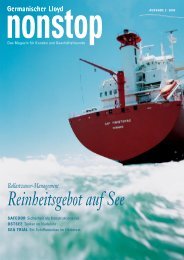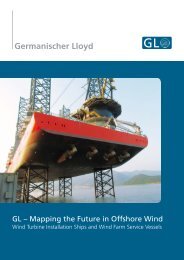Protection of Fuel Tanks Safety ahead! - GL Group
Protection of Fuel Tanks Safety ahead! - GL Group
Protection of Fuel Tanks Safety ahead! - GL Group
Create successful ePaper yourself
Turn your PDF publications into a flip-book with our unique Google optimized e-Paper software.
Waste Overboard?<br />
Proper waste disposal is <strong>of</strong> central signifi cance for the safety <strong>of</strong> crew and cargo, the environment<br />
and, last but not least, the image <strong>of</strong> the shipping company. At the <strong>GL</strong> Academy, experts<br />
are on hand to refresh the knowledge and skills <strong>of</strong> the participants<br />
Green, grey and brown refuse bins, yellow disposal<br />
bags, special containers for paper, green glass and<br />
white glass are waiting in the towns. And they are<br />
regularly collected by refuse collectors. Getting rid <strong>of</strong><br />
refuse is no problem for landlubbers. Things are a bit more<br />
difficult on the high seas. Where can a captain dump his<br />
plastic bottles when at that moment he is cruising between<br />
Kiribati and Nauru? What to do with all the greasy cleaning<br />
rags, the banana skins, the oil residues from the engine<br />
room, and the used hypodermics from the sickbay? “Waste<br />
overboard” is certainly one answer – but not a very environmentally<br />
friendly one. Seals perish in plastic foil, and<br />
fishes get caught in bags or die from swallowing splinters<br />
<strong>of</strong> glass. But the safety <strong>of</strong> the crew and cargo too is at risk.<br />
Chemicals that are not disposed <strong>of</strong> in the proper manner<br />
can lead to fires and explosions, while bits <strong>of</strong> plastic floating<br />
in the waves can clog up cooling water inlets or block<br />
the propeller.<br />
Apart from that, the simple throw-away solution is completely<br />
illegal in many cases.<br />
Laws are in place on all levels to restrict the disposal <strong>of</strong><br />
waste from ships. The International Maritime Organization,<br />
each flag state, every coastal nation, ports and shipowners,<br />
associations such as INTERTANKO, the International<br />
Council <strong>of</strong> Cruise Lines (ICCL), the Baltic and International<br />
Maritime Council (BIMCO) and the International Chamber<br />
<strong>of</strong> Shipping (ICS) – have all issued their own recommendations<br />
and regulations on waste management. In this tangled<br />
web <strong>of</strong> legislation, it is difficult to keep a clear overview.<br />
Exchange across Industry Sectors<br />
The necessary clarity is given by the “Waste Management”<br />
seminar <strong>of</strong>fered by the <strong>GL</strong> Academy. Henning Gramann,<br />
environmental engineer and specialist for maritime waste<br />
management at Germanischer Lloyd, conducts this course<br />
for the ships’ masters and crews <strong>of</strong> merchant ships and<br />
cruise liners, for the staff <strong>of</strong> port reception facilities and<br />
disposal companies, and also for plant manufacturers. The<br />
seminar’s objective is to inform the participants about the<br />
statutory and technical fundamentals as well as new developments<br />
in waste disposal. In addition, checks by the<br />
authorities, the obligation for reporting and recording<br />
disposal actions, and optimization <strong>of</strong> waste management<br />
activities on board are also on the agenda. This one-day<br />
seminar in Hamburg <strong>of</strong>fers the participants from a wide<br />
range <strong>of</strong> fields many opportunities for an exchange <strong>of</strong> experience,<br />
and also throws up topical issues that stimulate<br />
controversial discussions.<br />
Tons <strong>of</strong> Sludge, Cooking Oil and Wood<br />
Every day, a 2100 TEU container ship with a main engine <strong>of</strong><br />
12,500 kilowatts uses up 53,000 litres <strong>of</strong> fuel and 140 litres<br />
<strong>of</strong> lubricating oil. The “ship’s leftovers” include two tons <strong>of</strong><br />
Photo: Jorgen Udvang – FOTOLIA<br />
MARPOL | MARITIME SERVICES<br />
oil residues, 5 to 10 cubic metres <strong>of</strong> oily bilge water, 160<br />
tonnes <strong>of</strong> carbon dioxide, 0.9 tonnes <strong>of</strong> carbon monoxide,<br />
4.3 tonnes <strong>of</strong> sulphur compounds, and 2.7 tonnes <strong>of</strong> nitrogen<br />
oxides. And such a cargo ship is one <strong>of</strong> the more economical<br />
vessels. Added to this, you have the leftovers from<br />
the messroom and galley, the empty tins <strong>of</strong> paint, dunnage<br />
wood, shrink-wrap, cargo remainders, ...<br />
The boom in shipping is making it all the more important<br />
to ensure that these remnants do not end up in the sea.<br />
The oceans are largely unexplored. We know more about<br />
the moon than about the icy depths. But one thing is sure:<br />
whatever is put into the sea will pop up again somewhere,<br />
sometime. For example, a packet <strong>of</strong> crisps was found in<br />
Antarctica. Its best-before date had long since elapsed, so<br />
it had probably been drifting about for many years. Such<br />
a plastic bag takes years to decompose. Even a garment <strong>of</strong><br />
natural wool needs a whole year to decay, treated wood<br />
takes 13 years, a tin is estimated to last a century, and plastic<br />
bottles over 450 years. With the aim <strong>of</strong> protecting the SHANGHAI.<br />
oceans, the International Maritime A single-hull Organization tanker under (IMO) construction.<br />
formulated MARPOL as a globally binding convention to<br />
prevent marine pollution by ships. The basic principle <strong>of</strong><br />
MARPOL Annex V, for instance, is to make sure that, <strong>of</strong> all<br />
the waste produced by ships, as little as possible passes<br />
into the sea. Instead, the waste is to be transferred to port<br />
reception facilities.<br />
Tighter Regulations<br />
All seafaring nations have pledged to observe MARPOL.<br />
From the viewpoint <strong>of</strong> some states, the restrictions go too<br />
far, but many other countries believe the requirements<br />
STAPLE GOODS. Full containers with on-board wastes wait at the<br />
dock for collection.<br />
nonstop 4/2006<br />
33



